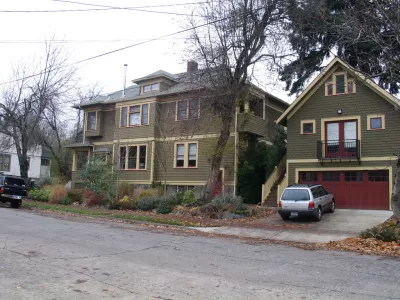Proponents of a new Accessory Dwelling Unit rule in Seattle say the tactics of opponents backfired with this Environmental Impact Study.

Dan Bertolet reports from Seattle, where the city recently released a highly anticipated Environmental Impact Study (EIS) on a proposed rule change that would allow for more construction of Accessory Dwelling Units in Seattle's residential neighborhoods.
According to Bertolet, the study was provoked by an appeal by anti-development activists led by Marty Kaplan. Bertolet provides a scathing critique of Kaplan's obstructionist positions in an earlier post from April 2017.
Now the environmental study responds to the appeal, and Bertolet says it reveals the appeal as "bunk": "baseless claims eviscerated by analysis and evidence." As an example, see here Bertolet's analysis of concerns about displacement:
The appeal’s most grievous complaint was that making it easier to build accessory dwelling units (ADUs) would lead to displacement in lower-income communities of color. In other words, poor people would lose homes to rich speculators.
The appeal’s most grievous complaint was that making it easier to build accessory dwelling units (ADUs) would lead to displacement in lower-income communities of color. In other words, poor people would lose homes to rich speculators. As the appeal’s de-facto leader, Marty Kaplan, warned: “There would be a feeding frenzy for anybody with a truck and a nail bag to go buy homes and convert them into three rental units and displace the population.”
Math begs to differ. The EIS finds that relaxing ADU rules would lead to fewer teardowns of existing single-family houses—which would decrease the likelihood of renter displacement—and that teardowns are less likely in lower-priced neighborhoods to begin with. It also demonstrates that in Seattle the value of selling a house, with or without ADUs, eclipses the value derived from renting. So much for any rental conversion “feeding frenzy.”
Bertolet also analyzes the study's findings regarding parking, before pointing a finger at the enabler for the study's delay: the Washington State Environmental Policy Act (SEPA). A lot more analysis of the study follows. If you're looking for more, there's also another article along the same lines written earlier in the week by Erica Barnett.
FULL STORY: SEATTLE’S NEW ENVIRONMENTAL STUDY ON ACCESSORY DWELLINGS OBLITERATES OBSTRUCTIONISTS’ CLAIMS

Maui's Vacation Rental Debate Turns Ugly
Verbal attacks, misinformation campaigns and fistfights plague a high-stakes debate to convert thousands of vacation rentals into long-term housing.

Planetizen Federal Action Tracker
A weekly monitor of how Trump’s orders and actions are impacting planners and planning in America.

In Urban Planning, AI Prompting Could be the New Design Thinking
Creativity has long been key to great urban design. What if we see AI as our new creative partner?

King County Supportive Housing Program Offers Hope for Unhoused Residents
The county is taking a ‘Housing First’ approach that prioritizes getting people into housing, then offering wraparound supportive services.

Researchers Use AI to Get Clearer Picture of US Housing
Analysts are using artificial intelligence to supercharge their research by allowing them to comb through data faster. Though these AI tools can be error prone, they save time and housing researchers are optimistic about the future.

Making Shared Micromobility More Inclusive
Cities and shared mobility system operators can do more to include people with disabilities in planning and operations, per a new report.
Urban Design for Planners 1: Software Tools
This six-course series explores essential urban design concepts using open source software and equips planners with the tools they need to participate fully in the urban design process.
Planning for Universal Design
Learn the tools for implementing Universal Design in planning regulations.
planning NEXT
Appalachian Highlands Housing Partners
Mpact (founded as Rail~Volution)
City of Camden Redevelopment Agency
City of Astoria
City of Portland
City of Laramie





























